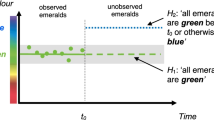Abstract
The aim of this paper is to show that the interpretivist account of propositional attitudes fails even at the most plausible reading that treats this theory as a version of the deflationary approach to existence coupled with a metaphysical claim about the judgement-dependence of propositional attitudes. It will be argued that adopting a deflationary reading of interpretivism allows this theory to avoid the common charge of fictionalism, according to which interpretivists cannot maintain realism about attitudes as their theory becomes a covert form of mental fictionalism. However, as will be shown, the deflationary version of interpretivism faces a fatal dilemma: either it becomes indistinguishable from generic deflationism about the mental, or it must embrace the metaphysical thesis of judgement-dependence of propositional attitudes. The latter option leads to unacceptable epistemological consequences, as it cannot accommodate intuitions about possibility of error in attribution of attitudes. Thus, it turns out that even a subtle version of interpretivism is not a viable theory of intentional states.
Similar content being viewed by others
References
Braddon-Mitchell, D., & Jackson, F. (2007). The philosophy of mind and cognition (2nd ed.). Oxford: Blackwell.
Byrne, A. (1998). Interpretivism. European Review of Philosophy, 3, 199–223.
Carruthers, P. (2013). On knowing your own beliefs: A representationalist account. In N. Nottelman (Ed.), New essays on belief (pp. 145–165). London: Palgrave McMillan.
Churchland, P. (1981). Eliminative materialism and the propositional attitudes. Journal of Philosophy, 78(February), 67–90.
Davidson, D. (1970). Mental events. In L. Foster & J. W. Swanson (Eds.), Experience and theory (pp. 79–101). Humanities Press.
Davidson, D. (2001). Psychology as philosophy. In Essays on actions and events (pp. 229–238). Oxford: Oxford University Press.
Davidson, D. (2004). Problems in the Explanation of Action. In Problems of Rationality (pp. 101–116). Oxford: Oxford University Press.
De Brigard, F. (2015). What was I thinking? Dennett’s content and consciousness and the reality of propositional attitudes. In C. M. Muñoz-Suárez & F. De Brigard (Eds.), Content and consciousness revisited (pp. 49–71). New York: Springer.
Demeter, T. (2013). Mental Fictionalism: The very idea. The Monist, 96(4), 483–504.
Dennett, D. (1989). The intentional stance. Cambridge: MIT Press.
Dennett, D. (1991). Real patterns. Journal of Philosophy, 88(1), 27–51.
Eklund, M. (2015). Fictionalism. In E. Zalta (Ed.), The Stanford encyclopedia of philosophy (Winter 2015 Edition), http://plato.stanford.edu/archives/win2015/entries/fictionalism/.
Eronen, M. I. (2017). Interventionism for the intentional Stance: True Believers and Their Brains. Topoi. https://doi.org/10.1007/s11245-017-9513-5.
Fodor, J. (1985). Fodor’s guide to mental representations. Mind, 94, 76–100.
Hutto, D. (2013). Fictionalism about folk psychology. The Monist, 96(4), 582–604.
Jackson, F., & Pettit, P. (1990). In defense of folk psychology. Philosophical Studies, 59(1), 31–54.
Jackson, F., & Pettit, P. (1993). Folk belief and commonplace belief. Mind & Language, 8(2), 298–305.
Johnston, M. (1992). The missing-explanation argument and its impact on subjectivism. University of Michigan: Public Lecture.
Kriegel, U. (2010). Interpretation: Its scope and limits. In A. Hazlett (Ed.), New waves in metaphysics (pp. 111–135). London: Palgrave Macmillan.
Kukla, R. (2018). Embodied stances. Realism without literalism. In B. Huebner (Ed.), The philosophy of Daniel Dennett (pp. 3–31). Oxford: Oxford University Press.
McCulloch, G. (1990). Dennett's little grains of salt. The Philosophical Quarterly, 40(158), 1–12.
Mölder, B. (2010). Mind ascribed. An elaboration and defence of interpretivism. Amsterdam: John Benjamins.
Mölder, B. (2017). Mind re-ascribed. Studia Philosophica Estonica, 10(2), 55–104.
Schwitzgebel, E. (2002). A phenomenal, dispositional account of belief. Noûs, 36(2), 249–275.
Schwitzgebel, E. (2013). A dispositional approach to attitudes: Thinking outside of the belief box. In N. Nottelmann (Ed.), New essays on belief: Constitution, content, and structure (pp. 75–99). London: Palgrave Macmillan.
Slors, M. (2007). Intentional systems theory, mental causation and empathic resonance. Erkenntnis, 67(2), 321–336.
Slors, M. (2017). Interpretivism and the Meaning of Mental State Ascriptions. Studia Philosophica Estonica, 10(2), 18–27.
Slors, M., de Bruin, L., & Strijbos, D. (2015). Philosophy of mind, brain and behaviour. Amsterdam: Boom.
Thomasson, A. L. (2015). Ontology made easy. Oxford: Oxford University Press.
Tollefsen, D. (2015). Groups as agents. Cambridge: Polity Press.
Toon, A. (2016). Fictionalism and the folk. The Monist, 99, 280–295.
Wallace, M. (2016). Saving mental Fictionalism from cognitive collapse. Res Philosophica, 93(2), 1–20.
Quine, W.V.O. (1960). Word & Object. MIT Press
Schiffer, S. (2003). The Things we mean. Oxford: Oxford University Press.
Acknowledgements
I am grateful to Szymon Bogacz, Pawel Banas, Bartosz Janik, Sonia Kaminska, Katarzyna Kijania-Placek, Joanna Komorowska-Mach, Zuzanna Krzykalska, and Iza Skoczen for their helpful comments.
Funding
The work on this paper was funded by National Science Centre, Poland, grant under award number UMO-2014/15/D/HS1/02722.
Author information
Authors and Affiliations
Corresponding author
Additional information
Publisher’s Note
Springer Nature remains neutral with regard to jurisdictional claims in published maps and institutional affiliations.
Rights and permissions
About this article
Cite this article
Poslajko, K. Can Deflationism Save Interpretivism?. Philosophia 48, 709–725 (2020). https://doi.org/10.1007/s11406-019-00155-8
Received:
Revised:
Accepted:
Published:
Issue Date:
DOI: https://doi.org/10.1007/s11406-019-00155-8




